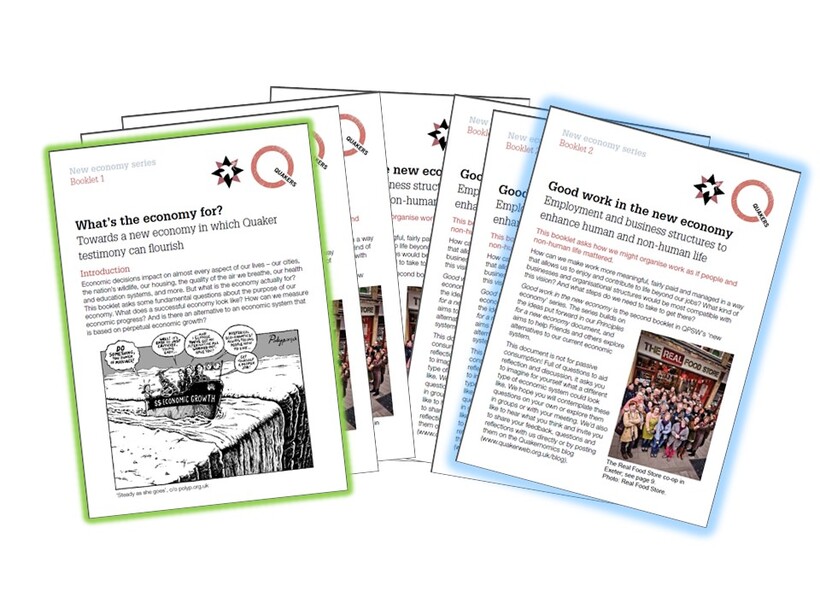Break up the banks? We need a banking revolution!
Following a Positive Money workshop, Sue Newsom was led to share the knowledge of how our banking systems work with a wider audience. In October 2016 London Quakers held a 'banking day' looking at global economic crises, inequality and ethical finance.

A concern to share knowledge about how our banking systems actually work grew from a workshop about 'Positive Money'. The workshop was led by Sue Holden, at North London Area Meeting in November 2014. She introduced us all to the issue of how 97% of money in the UK is created by banks as debt and how this has led to an economy that does not serve the citizens of the UK well.
Sue presented the framework for a solution developed by the campaign group Positive Money, a group supported financially at its inception by Quakers. As an area meeting we agreed we wanted to share this knowledge more widely.
Giving weight to a campaign for change
We wondered if London Quakers might hold an event to consider this and to discern how our Quaker testimonies might underpin and give weight to the campaign for change. The programme for London Quakers for 2015 was already arranged but they were ready to support us if we could find speakers.
I contacted Quaker Peace & Social Witness (QPSW) in January 2015 to see what work they were involved with in connection with the banking system, and work on the New Economy was underway. A date was fixed with London Quakers for 1 October 2016, nearly two years after our original area meeting minute.
Finding speakers
Concern about this issue kept reappearing in my day to day thoughts and in my worship. It would not lie down! Then in the summer of 2015 I went to see a musical about the American banking system, Barack and the Beanstalk, written by David Shirreff, journalist and writer who until recently covered business and finance at The Economist. He has also written Don't Start From Here. We Need A Banking Revolution and Break up the Banks! I was impressed by the 10 remedies he suggested for improving banking systems and practices. I contacted David and he was ready to speak.
I also made links with Quakers and Business, attending one of their conferences. They were very supportive and made suggestions for how we could use the day. It was through them we made links to Triodos Bank, who were also willing to come and be part of the day. As was Fran Boait, Director of Positive Money. .
Other speakers also came forward. Through David Shirreff we heard that Monica Middleton, National Director of Oikocredit, was willing to contribute to the day. Then through a member of Purley Meeting, that John Adams, previously a banking supervisor at the Bank of England and now a lecturer in the UK banking system, was also keen to contribute. It truly felt like the day had a momentum of its own.
Planning the day
[QUOTE-START]
The global economic system…is often unjust, violent and destructive…We must urgently work with others of faith and good will to put in its place a different system in which our testimonies can flourish.
- BYM 2011, Minute 23
[QUOTE-END]
I started to attend London Quakers committee meetings to begin planning the day. Two Friends on the committee offered to work with me on the organisation and structure of the day. This was invaluable. I felt spiritually upheld in the work I was doing. They arranged for the hospitality arrangements at Friends House and put all the publicity and paperwork in place. I kept in touch with all of our speakers about their themes and contributions and learnt more about the urgent need for change.
I had a strong sense that this was work I was being led to do. I reflected on Advices and Queries 34, “Remember your responsibilities as a citizen for the conduct of local, national and international affairs…." And also BYM 2011, Minute 23, “The global economic system…is often unjust, violent and destructive…We must urgently work with others of faith and good will to put in its place a different system in which our testimonies can flourish."
During this preparation time I received much information and support from the QPSW team. Cait Crosse, programme manager of the new economy project, was also keen to contribute and share the work her team had been doing.
On the day
So on 1 October, over a hundred people contemplated the need for a banking revolution at the London Quakers conference at Friends House.
It was a great day, and the banking issue was bought to life by all of the speakers through the day. We left having learnt more about the global economic crises, and how money creation can lead to rising house prices, debt, financial crisis, unemployment, government deficit, austerity and inequality.
We were inspired by the work of Oikocredit Cooperative and Triodos bank. Both of whom are offering a real alternative for people looking for ethical banking solutions.
By the end of the day participants were full of ideas for how the banking system could change, and Cait Crosse from QPSW encouraged us to continue exploring all of the issues that had come out of today through the new economy reading groups and workshops.
The speakers presentations are available on the London Quakers website.
London Quakers are now considering how next steps and we may run another event on economics in 2017.